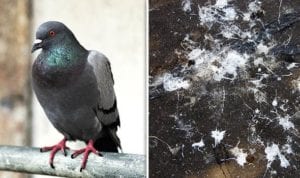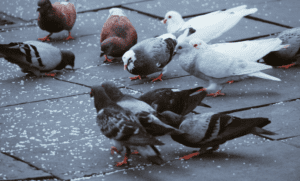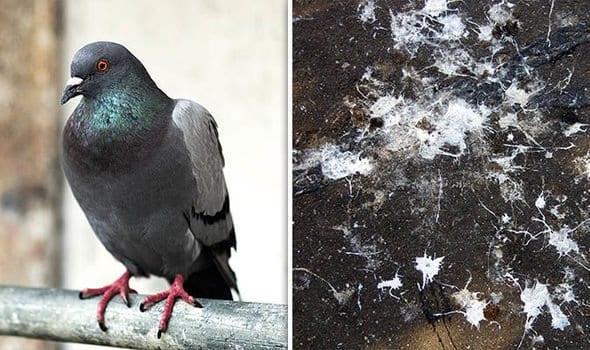
by Pigeon Patrol | Mar 23, 2023 | Bird Spike, Pigeon Predators, Pigeon Spikes, Pigeons, Pigeons in the News, Raccoons, Sparrows, UltraSonic Bird Control
Among the most famous images of London’s Trafalgar Square is one of people feeding pigeons in its grounds. And closer to home, feeding these birds was a favourite pastime on the weekends around the Vidhana Soudha, when people flocked to it for a bit of relaxation in its gardens. But no more, as the pigeons are now as numerous in most parts of the city as they were once around it.
Far from feeding them, people have now taken to shooing them away as they invade their balconies and kitchens, building nests and dirtying them with their poop and feathers. Their numbers have become their downfall as they are no longer priced as pets either. Instead they are the flying rats of urban Bengaluru.
Observes one fed up Bengalurean, industrialist, Narendra Kumar, “Pigeons have adapted so well to our urban civilisation that they are driving other birds away. Cleaning pigeon droppings has become a huge problem today. People in high- rise buildings are the worst affected and even the plants on the balconies suffer as a result of their invasion.”
But what’s worse, the pigeon droppings are not just an eyesore, but also a health hazard, warn wildlife experts. With the pigeon population growing, they have been spreading diseases like avian influenza and castle fever through their droppings, according to them. “ The pigeon droppings contain bacteria and fungus, which can cause major lung disorders that can be fatal,” they explain.
It is also claimed that those who fall sick as a result of the pigeon droppings, find recovery hard despite downing antibiotics, because of the strong infection they transmit. Bird lovers too admit to being on their guard when it comes to these birds because of the infections and diseases they transmit.
The BBMP , which has received numerous complaints from people about the pigeon menace, is now planning to hold a meeting with wildlife experts, bird lovers , health experts and concerned citizens to deal with it, says Mr Sarfaraz Khan, BBMP joint commissioner (health).
The civic agency is reportedly considering taking a cue from other countries, which have effectively dealt with the growing population of pigeons without harming the ecology and is also planning a study on their impact on humans, animals and other bird species.
Source
Pigeon Patrol Products & Services is the leading manufacturer and distributor or bird deterrent (control) products in Canada. Pigeon Patrol products have solved pest bird problems in industrial, commercial, and residential settings since 2000, by using safe and humane bird
deterrents with only bird and animal friendly solutions. At Pigeon Patrol, we manufacture and offer a variety of bird deterrents, ranging from Ultra-flex Bird Spikes with UV protection, Bird Netting, 4-S Bird Gel and the best Ultrasonic and audible sound devices on the market today.
Voted Best Canadian wholesaler for Bird Deterrent products ten years in a row.
Contact us at 1 877-4-NO-BIRD,(604) 585-9279 or visit our website at www.pigeonpatrol.ca
Pigeon/Pigeon Patrol / Pigeons Roosing / Vancouver Pigeon Control / Bird Spikes / Bird Control / Bird Deterrent / PIgeon Deterrent / Surrey Pigeon Control / Pest / Seagull deterrent / Vancouver Pigeon Blog / Birds Inside Home / Pigeons in the cities / Ice Pigeons / What to do about pigeons / sparrows, Damage by Sparrows, How to Keep Raccoons Away, Why Are Raccoons Considered Pests / De-fence / Pigeon Nesting / Bird Droppings / Pigeon Dropping / woodpecker control / Professional Bird Control Company / Keep The Birds Away / Birds/rats/seagull/pigeon/woodpecker/dove/sparrow/pidgeon control/pidgeon problem/pidgeon control/flying rats/pigeon problems/ bird netting/bird gel/bird spray/bird nails/bird guard
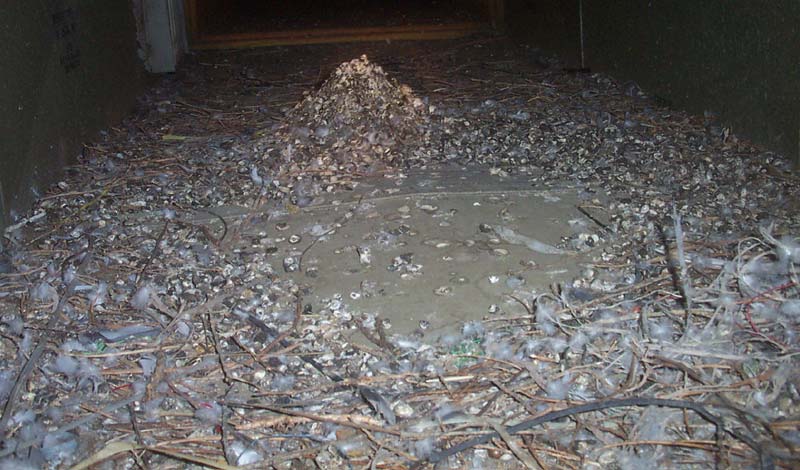
by Pigeon Patrol | Mar 23, 2023 | Bird Spike, Pigeon Predators, Pigeon Spikes, Pigeons, Pigeons in the News, Raccoons, Sparrows, UltraSonic Bird Control
Pigeons are highly social animals and are incredibly smart creatures. But did you know pigeons carry many diseases and parasites linked to their droppings? When pigeons start roosting on your property, they will rapidly create a vast mess with their poop. Not only are pigeon droppings in your home disgusting, but they can carry major risks to your wellbeing and can cause havoc on your property. However, the danger varies depending on the invasion. If you have a pigeon invasion on your property, there is a huge risk of your family members contracting illnesses from their droppings. Histoplasmosis, Candidiasis, Cryptococcosis, Psittacosis, Encephalitis, and Salmonellosis are some of the deadly diseases spread through pigeon droppings. The safe bet is to handle your pigeon invasion quickly by calling a professional pest control company to eradicate any risk of disease.
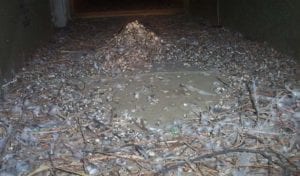
In addition to the disease and infection, pigeons can also carry parasites, ticks, and mites. A dead pigeon is more of a breeding ground for flies and pests. We at Accurate Pest Control believe, the more established the pigeon infestation, the more significant danger of having these pests getting into your property.
How hazardous are Pigeon droppings?
- When an individual breaths dust or water droplets of contaminated bird droppings, it can cause several diseases, including aflu-like illness known as Psittacosis.
- Salmonella is a bacterial virus that can cause Diarrhea. Pigeons with this type of bacteria can spread it through their droppings.
- One must take safety measures when they are cleaning up or come in contact with pigeon droppings. Make sure to rinse your hands and clean any bare skin before eating, drinking, or placing your hands near your mouth. Similarly, if you are feeding or handling birds, wash your hands afterwards.
- Individuals with a compromised immune system, like HIV/AIDS or cancer, must avoid cleaning the droppings as it can be fatal.
How can you catch it?
- Anyone can become affected if he/she breathes it in. The infant who died at the hospital in Glasgow, Scotland, had been exposed to the fungus. Experts reveal the apparent source has been traced to a room on the rooftop of the hospital.
- Bird feces and feathers can disturb your home’s heating and cooling modules and indoor air quality.
- Pigeon droppings contaminated with bacteria or viruses are often left on the windowsills and cars to dry out.
The best thing you can do to get rid of your pigeon problem is to call licensed pest control in San Antonio, Texas. Our Wildlife animal control in San Antonio uses proper techniques to keep your home or business free from unwanted critters and ensure that these creatures are removed safely. To improve the situation, you must ensure all areas are properly cleaned, and preventive measures are taken to stop the birds from invading your home/property.
Source
Pigeon Patrol Products & Services is the leading manufacturer and distributor or bird deterrent (control) products in Canada. Pigeon Patrol products have solved pest bird problems in industrial, commercial, and residential settings since 2000, by using safe and humane bird
deterrents with only bird and animal friendly solutions. At Pigeon Patrol, we manufacture and offer a variety of bird deterrents, ranging from Ultra-flex Bird Spikes with UV protection, Bird Netting, 4-S Bird Gel and the best Ultrasonic and audible sound devices on the market today.
Voted Best Canadian wholesaler for Bird Deterrent products ten years in a row.
Contact us at 1 877-4-NO-BIRD,(604) 585-9279 or visit our website at www.pigeonpatrol.ca
Pigeon/Pigeon Patrol / Pigeons Roosing / Vancouver Pigeon Control / Bird Spikes / Bird Control / Bird Deterrent / PIgeon Deterrent / Surrey Pigeon Control / Pest / Seagull deterrent / Vancouver Pigeon Blog / Birds Inside Home / Pigeons in the cities / Ice Pigeons / What to do about pigeons / sparrows, Damage by Sparrows, How to Keep Raccoons Away, Why Are Raccoons Considered Pests / De-fence / Pigeon Nesting / Bird Droppings / Pigeon Dropping / woodpecker control / Professional Bird Control Company / Keep The Birds Away / Birds/rats/seagull/pigeon/woodpecker/dove/sparrow/pidgeon control/pidgeon problem/pidgeon control/flying rats/pigeon problems/ bird netting/bird gel/bird spray/bird nails/bird guard
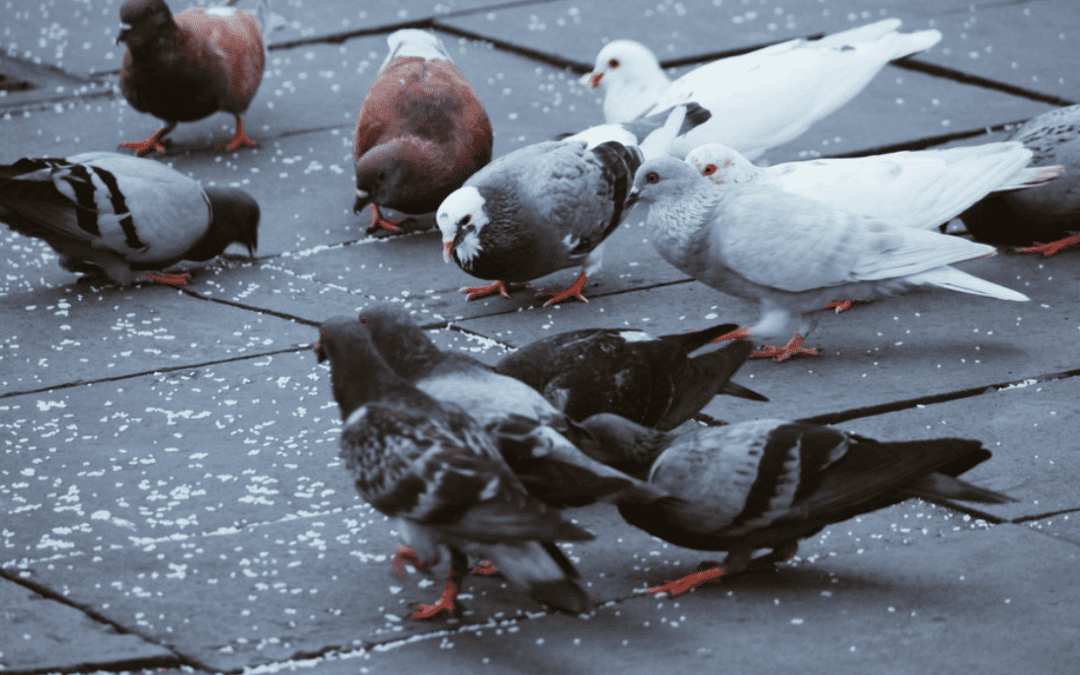
by Pigeon Patrol | Mar 16, 2023 | Bird Spike, Pigeon Predators, Pigeon Spikes, Pigeons, Pigeons in the News, Raccoons, Sparrows, UltraSonic Bird Control
Heading to his usual Sunday morning yoga class in Leslieville a few years ago, my husband, Peter, gave silent thanks when he found a sent-from-above parking spot right in front of the studio. He quickly eased his black Honda Fit, Jellybean, into the space and dashed to his class.
When Peter came out an hour and a half later, his car was so coated in poop he barely recognized it. “It looked like a bunch of elephants with wings had flown over my car and relieved themselves,” he said.
There were no pachyderms to be seen. Pigeons? Yes. Right above Jellybean a couple of hydro wires sagged under the weight of dozens of the city birds. There was only one thing to do. Peter drove straight to the old-timey car wash at Parliament and Front and paid the price to have the carapace of excrement removed. Twice.
Then there was the time our son’s girlfriend, Lisa, got pooped on at the bus stop at Lower Gerrard and Coxwell as she waited for her northbound bus to the subway. This stop is notorious for its pigeon problem and Lisa knew to be vigilant. But on this particular day she was running late for work, on her phone and not paying attention to the birds lined up like so many grey bombers in formation above her. When the bomb-bay doors opened, the blast hit her freshly washed hair. Thinking quickly, she dashed into one of the restaurants in Little India, washed the mess out and continued on her way.
Just another day trying to coexist peacefully with pigeons, the birds first dubbed “rats with wings” by New York City parks commissioner Thomas Hoving in 1966.
I didn’t think too much more about my family members’ run-ins with the tubby birds known officially as rock pigeons and formerly as rock doves. But a few weeks ago, our daughter, Em, mentioned that a family of pigeons had been hanging out on the peaked roof outside her bedroom window. That got my attention. In the more than 20 years we’ve lived here, none of us had ever seen a pigeon on any part of our roof.
Then a couple of nights ago, when I had my bedroom window open to allow the sweet-smelling evening breezes in, I heard faint noises that sounded like the scritch-scratch of bubble-gum pink feet moving about in our eavestroughs.
The next day, I decided to see if I could get a look at the pigeons. It turns out I didn’t need special clearance from MI6 to spy on them through Em’s window. Far from flying off in a furious flap of wings as I neared the glass, they were thoroughly unperturbed by my approach.
There were three pigeons, all about the same size. A close look revealed two were fledglings and the third was an adult. The youngsters skittered up and down our grey roof tiles, pursuing their parent for food. Once they made contact, they pushed their beaks into their parent’s bill, as if to say, “Come on! We know you’ve got our crop milk in there.” But the adult was having none of it; its parental contract for food delivery had already ended.
Until I started reading about the birds on our roof, I had taken the common pigeon, Columba livia, for granted. I thought of them as birds that had always been here, part of the everyday fabric of city life.
While it’s true rock pigeons have been associated with humans for many thousands of years, they haven’t always been in North America. They didn’t reach this continent until the early 1600s. Prior to this, rock pigeons were natural residents of Eurasia and North Africa, where their wild nests could be found in narrow crevices plentiful in sea cliffs, caves and canyons.
The latter fact explains why these birds have fared so well in both the New and Old Worlds. Wherever humans have created towns and cities, places with man-made structures that emulate cliffs, rock pigeons have found a home.
Beyond being evolutionarily successful, rock pigeons are beautiful birds with a regal carriage. Sure, they poop a lot. And it can be hazardous to park or walk under a flock of these birds on a wire. Step carefully, I say, and admire their shimmering, iridescent plumage.
And what of the birds on our roof? When I looked out Em’s window this morning, only the adult pigeon was there; the fledglings, rebuffed, had finally departed. A single small white feather remained on the tiles, a reminder of the pigeon family that was.
Source
Pigeon Patrol Products & Services is the leading manufacturer and distributor or bird deterrent (control) products in Canada. Pigeon Patrol products have solved pest bird problems in industrial, commercial, and residential settings since 2000, by using safe and humane bird
deterrents with only bird and animal friendly solutions. At Pigeon Patrol, we manufacture and offer a variety of bird deterrents, ranging from Ultra-flex Bird Spikes with UV protection, Bird Netting, 4-S Bird Gel and the best Ultrasonic and audible sound devices on the market today.
Voted Best Canadian wholesaler for Bird Deterrent products ten years in a row.
Contact us at 1 877-4-NO-BIRD,(604) 585-9279 or visit our website at www.pigeonpatrol.ca
Pigeon/Pigeon Patrol / Pigeons Roosing / Vancouver Pigeon Control / Bird Spikes / Bird Control / Bird Deterrent / PIgeon Deterrent / Surrey Pigeon Control / Pest / Seagull deterrent / Vancouver Pigeon Blog / Birds Inside Home / Pigeons in the cities / Ice Pigeons / What to do about pigeons / sparrows, Damage by Sparrows, How to Keep Raccoons Away, Why Are Raccoons Considered Pests / De-fence / Pigeon Nesting / Bird Droppings / Pigeon Dropping / woodpecker control / Professional Bird Control Company / Keep The Birds Away / Birds/rats/seagull/pigeon/woodpecker/dove/sparrow/pidgeon control/pidgeon problem/pidgeon control/flying rats/pigeon problems/ bird netting/bird gel/bird spray/bird nails/bird guard
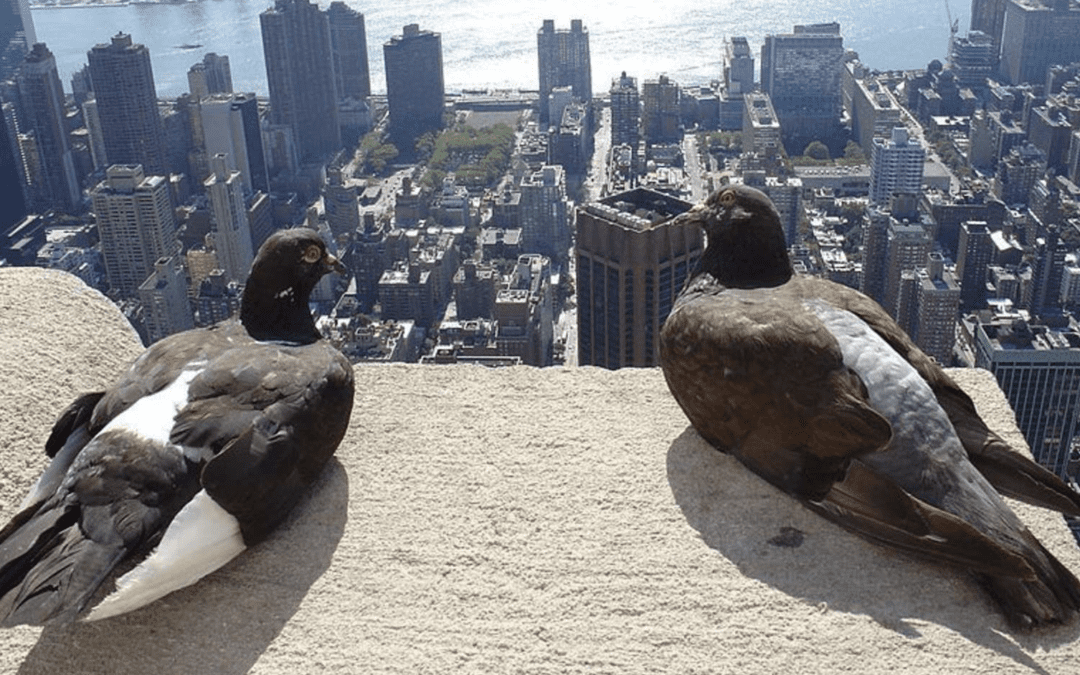
by Pigeon Patrol | Mar 16, 2023 | Bird Spike, Pigeon Spikes, Pigeons, Pigeons in the News, Raccoons, Sparrows, UltraSonic Bird Control
Homing pigeons are a remarkable species with internal compasses that are able to memorize landmarks to retrace a path home. But one particular bird ended up so far off its course, it would have been a miracle for her to find her way back.

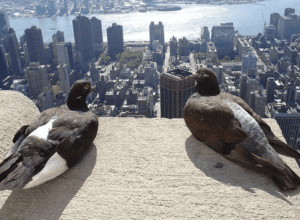
After being found frozen to a front porch, she was taken in by Calgarian Alex Gray who didn’t know what else to do and posted on social media, eventually tracking down Jeanie Palmer, a woman who raises and rescues pigeons.
“There were a lot of people who wanted the bird but couldn’t prove it was theirs, so I reached out to Jeanie and I said: ‘Alright, we don’t have traction and she doesn’t seem happy by herself, so by all means, come and get her,’” Gray said.
Once Palmer got her home she did some digging and, being a member of the Canadian Pigeon Fancier’s Association, she reached out to her fellow fanciers who helped her identify the tag.
She’s from the Netherlands and belonged to Henk Bax, a man who races pigeons.
“He said, this bird went missing from a race in Vervins, France on April 25, 2021. She was 200 kilometres from the coop and a year-and-a-half later she winds up on the sidewalk in Calgary, Alberta,” Palmer said.
The Dutch owner gave his blessing to keep the pigeon.
“How would you fly from France all the way here? How would she make that? I don’t think she could have made it that far, kudos to her if she did,” Palmer said.
“There’s a reason we named her Amelia Earhart, maybe she did fly here,” Palmer said.
“My jaw dropped,” Gray said.
Both could hardly believe it.
“This could be a book. The bird who flew across the world, or the pigeon who got lost. You could make up any adventures you wanted her to be on. The fact I have her is crazy to me, pretty lucky,” Palmer said.
She’s retiring from racing and will officially become a Canadian. It isn’t legal to ship a bird from Canada to the Netherlands.
“She’s going to join my coop and be a spoiled lazy pigeon. Hopefully she will pick one of my handsome boys and have a happy little family of her own,” Palmer said.
Source
Pigeon Patrol Products & Services is the leading manufacturer and distributor or bird deterrent (control) products in Canada. Pigeon Patrol products have solved pest bird problems in industrial, commercial, and residential settings since 2000, by using safe and humane bird
deterrents with only bird and animal friendly solutions. At Pigeon Patrol, we manufacture and offer a variety of bird deterrents, ranging from Ultra-flex Bird Spikes with UV protection, Bird Netting, 4-S Bird Gel and the best Ultrasonic and audible sound devices on the market today.
Voted Best Canadian wholesaler for Bird Deterrent products ten years in a row.
Contact us at 1 877-4-NO-BIRD,(604) 585-9279 or visit our website at www.pigeonpatrol.ca
Pigeon/Pigeon Patrol / Pigeons Roosing / Vancouver Pigeon Control / Bird Spikes / Bird Control / Bird Deterrent / PIgeon Deterrent / Surrey Pigeon Control / Pest / Seagull deterrent / Vancouver Pigeon Blog / Birds Inside Home / Pigeons in the cities / Ice Pigeons / What to do about pigeons / sparrows, Damage by Sparrows, How to Keep Raccoons Away, Why Are Raccoons Considered Pests / De-fence / Pigeon Nesting / Bird Droppings / Pigeon Dropping / woodpecker control / Professional Bird Control Company / Keep The Birds Away / Birds/rats/seagull/pigeon/woodpecker/dove/sparrow/pidgeon control/pidgeon problem/pidgeon control/flying rats/pigeon problems/ bird netting/bird gel/bird spray/bird nails/bird guard
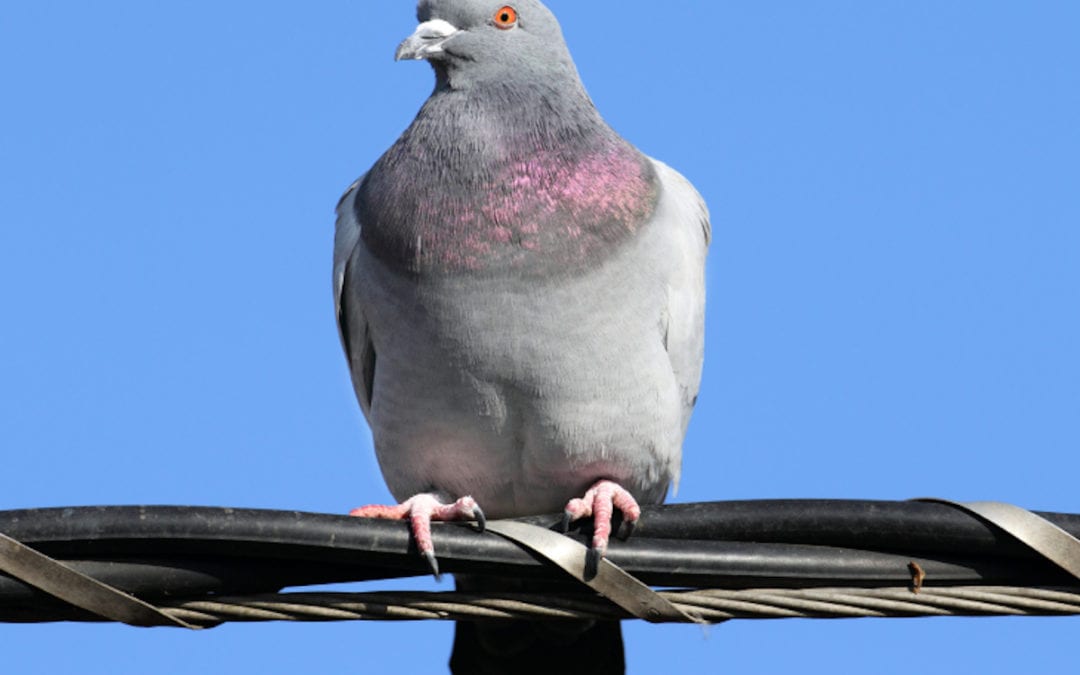
by Pigeon Patrol | Mar 16, 2023 | Bird Spike, Pigeon Predators, Pigeon Spikes, Pigeons, Pigeons in the News, Raccoons, Sparrows, UltraSonic Bird Control
Police in Edmonton are looking for help to solve an unusual crime involving dozens of pigeons.
Video captured on Tuesday night shows a man carrying a large bin and snooping around a pigeon enclosure in the backyard of a home on Checknita Way SW around 9:25 p.m.
Someone noticed the man, wearing a white tank top and shoulder holster, and called in a “suspicious person” complaint.
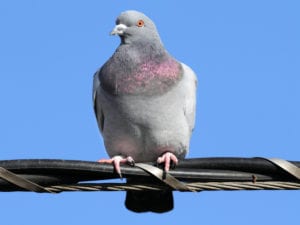
Feral Rock Pigeon (Columba livia) perched with a blue sky background
Before officers arrived, the man made off with 45 of the homeowners’ 60 competition pigeons, Edmonton Police Service said.
The birds are worth about $300 each, making it a loss of $13,500.
“What’s interesting about the video is that the suspect is wearing fairly distinctive clothing and it looks like some sort of fashion item or wallet that he’s wearing and that may help people recognize who he is,” said Cheryl Voordenhout with EPS.
City of Edmonton bylaws permit homeowners to have up to 75 pigeons.
Source
Pigeon Patrol Products & Services is the leading manufacturer and distributor or bird deterrent (control) products in Canada. Pigeon Patrol products have solved pest bird problems in industrial, commercial, and residential settings since 2000, by using safe and humane bird
deterrents with only bird and animal friendly solutions. At Pigeon Patrol, we manufacture and offer a variety of bird deterrents, ranging from Ultra-flex Bird Spikes with UV protection, Bird Netting, 4-S Bird Gel and the best Ultrasonic and audible sound devices on the market today.
Voted Best Canadian wholesaler for Bird Deterrent products ten years in a row.
Contact us at 1 877-4-NO-BIRD,(604) 585-9279 or visit our website at www.pigeonpatrol.ca
Pigeon/Pigeon Patrol / Pigeons Roosing / Vancouver Pigeon Control / Bird Spikes / Bird Control / Bird Deterrent / PIgeon Deterrent / Surrey Pigeon Control / Pest / Seagull deterrent / Vancouver Pigeon Blog / Birds Inside Home / Pigeons in the cities / Ice Pigeons / What to do about pigeons / sparrows, Damage by Sparrows, How to Keep Raccoons Away, Why Are Raccoons Considered Pests / De-fence / Pigeon Nesting / Bird Droppings / Pigeon Dropping / woodpecker control / Professional Bird Control Company / Keep The Birds Away / Birds/rats/seagull/pigeon/woodpecker/dove/sparrow/pidgeon control/pidgeon problem/pidgeon control/flying rats/pigeon problems/ bird netting/bird gel/bird spray/bird nails/bird guard
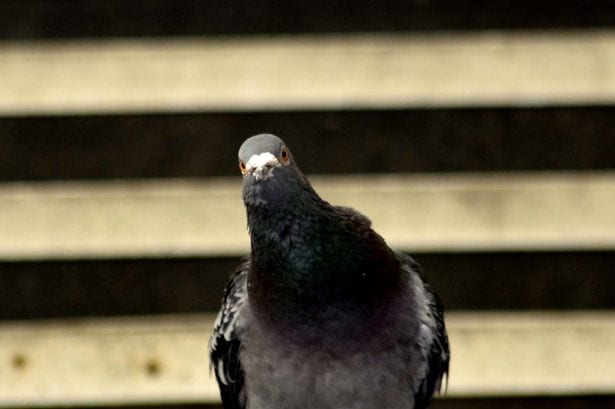
by Pigeon Patrol | Mar 6, 2023 | Bird Spike, Pigeon Spikes, Pigeons, Pigeons in the News, Raccoons, Sparrows, UltraSonic Bird Control
In 2019, not long before the unusual weather event that changed day into night in São Paulo City (Brazil), dozens of pigeons mysteriously dropped dead. Birds displaying wounds as well as neurological symptoms were found dead or dying near the municipal animal disease control center.
A multicenter research team discovered that the deaths were unrelated to the pollution blown into the city from forest fires in the Amazon, despite the proximity of the dates, but were in fact due to Newcastle disease virus (NDV), a serotype 1 avian paramyxovirus. The cases in question were caused by subgenotype VI.2.1.2, which is almost always deadly for pigeons. Also known as pigeon paramyxovirus (PPMV), this pathogen only rarely infects humans when transmitted by close contact with infected birds.
“We discovered that this virus has been circulating silently in Brazil since 2014. Our analysis of molecular data showed that it’s the same PPMV that had been identified five years before in Porto Alegre [the capital of Rio Grande do Sul state]. São Paulo and Porto Alegre are 1,100 km apart, which only goes to show how much the disease can spread without being noticed,” said Luciano Matsumiya Thomazelli, first author of an article on the team’s findings published in the journal Viruses. Thomazelli is affiliated with the University of São Paulo’s Biomedical Sciences Institute (ICB-USP), where he works at the Clinical and Molecular Virology Laboratory.
Since 2005, a team from the laboratory has conducted epidemiological surveillance in various parts of Brazil, under the aegis of the Virus Genetic Diversity Network (VGDN), which is funded by FAPESP and coordinated by Professor Edison Luiz Durigon, last author of the article.
The group also works with the Network for Surveillance of Viruses in Wild Animals (PREVIR), funded by the National Council for Scientific and Technological Development (CNPq), an arm of the Brazilian government’s Ministry for Science, Technology and Innovation (MCTI).
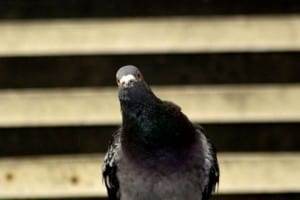
Deadly to pigeons
NDV normally causes disease in hens and chickens but not in pigeons. According to the researchers, however, the opposite occurs with subgenotype VI.2.1.2.
“It’s endemic in pigeon populations worldwide, causing neurological symptoms and high mortality rates. Cases are frequently reported in Asia, Europe and North America. Although this is the second reported outbreak in Brazil, there are no grounds for alarm because this subgenotype isn’t a significant threat to humans or poultry farmers,” said Helena Ferreira, a professor at the School of Animal Sciences and Food Engineering in Pirassununga (FZEA-USP), a member of PREVIR-MCTI, and principal investigator for the study.
The researchers stressed the importance of active surveillance and monitoring to control outbreaks and epidemics, and to provide early warning of the emergence of new diseases.
“Active surveillance throughout Brazil is vital to control pigeon populations near poultry farms and in urban areas,” Thomazelli said. “Monitoring of NDV is also important from the economic standpoint, as Brazil is the world’s leading exporter of frozen chicken.”
Before the researchers could identify the disease that was killing feral pigeons (Columba livia) in São Paulo, the animal disease control center and official veterinary service collected and organized several specimens of dead birds.
“Initially the cause of death was thought to be a bacterium, but no pathogenic species were identified,” Ferreira said. “They sent samples to ICB-USP and the Federal Agricultural Defense Laboratory [LFDA-SP], where characterization was performed, in line with the standard procedure for notifiable viral diseases affecting poultry. Our lab in Pirassununga then sequenced the viral genome.”
Her team also performed analyses to identify tissue wounds. “We sequenced the whole genome and identified the virus as VI.2.1.2,” she said. “This enables us to conduct an in-depth investigation, compare the outbreak with others elsewhere in the world, track the pathogen’s evolution in Brazil, and predict its behavior from now on, including whether it may adapt to other feral birds, for example.”
The genomic analysis showed that the virus found in São Paulo and Rio Grande do Sul (in 2014) can be grouped with samples from Africa.
“Other cases need to be identified so that we can propose classification of the genotype that has circulated in Brazil. It’s relatively different from the African one,” she said. “This kind of monitoring is most important. In the specific case in question, the genotype can’t infect domestic birds [hens] efficiently. If a hen is infected, it doesn’t transmit the virus to others in the same flock. However, studies have suggested that this genotype can adapt in hens over time and cause disease in other domestic birds. Even so, it isn’t considered very dangerous for commercial poultry.”
Source
Pigeon Patrol Products & Services is the leading manufacturer and distributor or bird deterrent (control) products in Canada. Pigeon Patrol products have solved pest bird problems in industrial, commercial, and residential settings since 2000, by using safe and humane bird
deterrents with only bird and animal friendly solutions. At Pigeon Patrol, we manufacture and offer a variety of bird deterrents, ranging from Ultra-flex Bird Spikes with UV protection, Bird Netting, 4-S Bird Gel and the best Ultrasonic and audible sound devices on the market today.
Voted Best Canadian wholesaler for Bird Deterrent products ten years in a row.
Contact us at 1 877-4-NO-BIRD,(604) 585-9279 or visit our website at www.pigeonpatrol.ca
Pigeon/Pigeon Patrol / Pigeons Roosing / Vancouver Pigeon Control / Bird Spikes / Bird Control / Bird Deterrent / PIgeon Deterrent / Surrey Pigeon Control / Pest / Seagull deterrent / Vancouver Pigeon Blog / Birds Inside Home / Pigeons in the cities / Ice Pigeons / What to do about pigeons / sparrows, Damage by Sparrows, How to Keep Raccoons Away, Why Are Raccoons Considered Pests / De-fence / Pigeon Nesting / Bird Droppings / Pigeon Dropping / woodpecker control / Professional Bird Control Company / Keep The Birds Away / Birds/rats/seagull/pigeon/woodpecker/dove/sparrow/pidgeon control/pidgeon problem/pidgeon control/flying rats/pigeon problems/ bird netting/bird gel/bird spray/bird nails/bird guard

